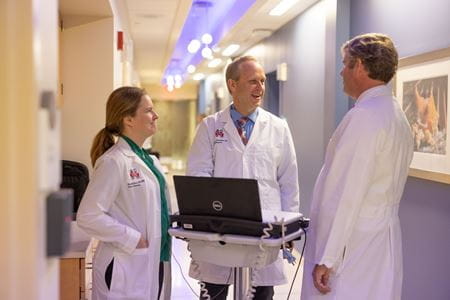INDIANAPOLIS — Researchers at the Indiana University School of Medicine are learning more about kidney damage in children with vesicoureteral reflux (VUR), a common congenital anomaly in children in which there is a back flow of urine from the bladder to the kidney.
Led by David Hains, MD; Michelle C. Starr, MD; and Andrew L. Schwaderer, MD, the team discovered that a commonly used test to evaluate the impact of recurrent urinary tract infections on the kidneys may not be the best method. They describe their findings in a newly-published letter in JAMA Pediatrics.
Vesicoureteral reflux affects 1-2% of all children and is often harmless. However, when a child with VUR contracts a urinary tract infection (UTI), the infection can ascend into the kidney, causing severe illness and potential permanent damage. But only 20% of children with VUR will have a UTI, and of those, only about a third will experience recurrent UTIs.
"For the past few decades, a clinical debate has existed amongst pediatricians, pediatric urologists, pediatric nephrologists, and other subspecialists on the best way to handle a child with VUR. We can observe kids and wait for them to grow out of it, but a small subset of those kids will have UTIs and maybe kidney damage," said Hains, who is the Byron P. and Frances D. Hollett Professor of Pediatric Nephrology at the IU School of Medicine. "Our team has been looking at genetic variations in genes that are critical in preventing UTIs, and we have found that kids with VUR and UTIs have more genetic variations in these urinary tract protection genes, and thus a possible source of some of their UTIs."
The researchers analyzed nearly 200 children with VUR and UTIs and examined the effectiveness of antibiotic prophylaxis versus observation. Children in both groups had no difference in new kidney scars at two years when measured by a dimercaptosuccinic acid (DMSA) scan. However, at the end of the study, compared to children without a UTI, children with multiple UTIs had a lower glomerular filtration rate, which is a measurement of how well the kidneys function.
"What has always bothered us is that our clinical experience hasn't completely lined up with all the clinical studies," Hains said. "Our biggest finding was that kids with multiple UTIs during the study who were on a placebo had a significant drop of 27 points in their kidney function compared to those kids who did not have a UTI. We didn't see this same drop for the kids on antibiotic prophylaxis. We also found that kidney function changes did not correlate to DMSA scan findings, suggesting that perhaps we are using the wrong test to study this issue. Medicine has changed dramatically over the past few decades, so using technology from the 1980s or earlier — or assuming that the ‘gold standard’ from that era still applies — may need to be reconsidered."
Researchers hope to continue their study using a larger cohort of patients in the future.
About Indiana University School of Medicine
The IU School of Medicine is the largest medical school in the U.S. and is annually ranked among the top medical schools in the nation by U.S. News & World Report. The school offers high-quality medical education, access to leading medical research and rich campus life in nine Indiana cities, including rural and urban locations consistently recognized for livability. According to the Blue Ridge Institute for Medical Research, the IU School of Medicine ranks No. 13 in 2023 National Institutes of Health funding among all public medical schools in the country.
Writer: Christina Griffiths
For more news, visit the IU School of Medicine Newsroom: medicine.iu.edu/news




